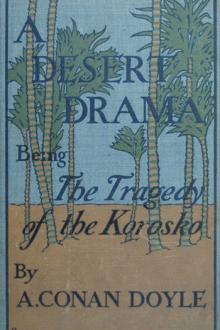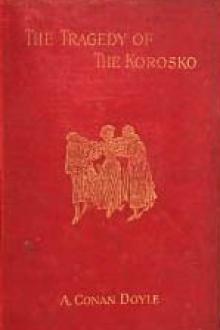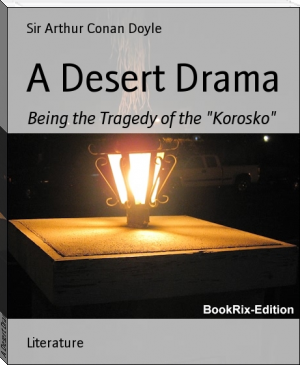A Desert Drama by Arthur Conan Doyle (uplifting book club books .TXT) 📖

- Author: Arthur Conan Doyle
- Performer: -
Book online «A Desert Drama by Arthur Conan Doyle (uplifting book club books .TXT) 📖». Author Arthur Conan Doyle
But Mr. Stephens had knelt down beside Sadie and buried his haggard face in his long, thin hands. Only the Colonel and Monsieur Fardet remained standing. Cochrane looked at the Frenchman with an interrogative eye.
“After all,” said he, “it is stupid to pray all your life, and not to pray now when we have nothing to hope for except through the goodness of Providence.” He dropped upon his knees with a rigid, military back, but his grizzled, unshaven chin upon his chest. The Frenchman looked at his kneeling companions, and then his eyes travelled onwards to the angry faces of the Emir and Moolah.
“Sapristi!” he growled. “Do they suppose that a Frenchman is afraid of them?” and so, with an ostentatious sign of the cross, he took his place upon his knees beside the others. Foul, bedraggled, and wretched, the seven figures knelt and waited humbly for their fate under the black shadow of the palm-tree.
The Emir turned to the Moolah with a mocking smile, and pointed at the results of his ministrations. Then he gave an order, and in an instant the four men were seized.
A couple of deft turns with a camel-halter secured each of their wrists. Fardet screamed out, for the rope had bitten into his open wound. The others took it with the dignity of despair.
“You have ruined everything. I believe you have ruined me also!” cried Mansoor, wringing his hands. “The women are to get upon these three camels.”
“Never!” cried Belmont. “We won't be separated!” He plunged madly, but he was weak from privation, and two strong men held him by each elbow.
“Don't fret, John!” cried his wife, as they hurried her towards the camel. “No harm shall come to me. Don't struggle, or they'll hurt you, dear.”
The four men writhed as they saw the women dragged away from them. All their agonies had been nothing to this. Sadie and her aunt appeared to be half senseless from fear. Only Mrs. Belmont kept a brave face. When they were seated the camels rose, and were led under the tree behind where the four men were standing.
“I've a pistol in me pocket,” said Belmont, looking up at his wife. “I would give me soul to be able to pass it to you.”
“Keep it, John, and it may be useful yet. I have no fears. Ever since we prayed I have felt as if our guardian angels had their wings round us.” She was like a guardian angel herself as she turned to the shrinking Sadie, and coaxed some little hope back into her despairing heart.
The short, thick Arab, who had been in command of Wad Ibrahim's rearguard, had joined the Emir and the Moolah; the three consulted together, with occasional oblique glances towards the prisoners. Then the Emir spoke to Mansoor.
“The chief wishes to know which of you four is the richest man?” said the dragoman. His fingers were twitching with nervousness and plucking incessantly at the front of his cover-coat.
“Why does he wish to know?” asked the Colonel.
“I do not know.”
“But it is evident,” cried Monsieur Fardet.
“He wishes to know which is the best worth keeping for his ransom.”
“I think we should see this thing through together,” said the Colonel. “It's really for you to decide, Stephens, for I have no doubt that you are the richest of us.”
“I don't know that I am,” the lawyer answered; “but, in any case, I have no wish to be placed upon a different footing to the others.”
The Emir spoke again in his harsh, rasping voice.
“He says,” Mansoor translated, “that the baggage-camels are spent, and that there is only one beast left which can keep up. It is ready now for one of you, and you have to decide among yourselves which is to have it. If one is richer than the others, he will have the preference.”
“Tell him that we are all equally rich.”
“In that case he says that you are to choose at once which is to have the camel.”
“And the others?”
The dragoman shrugged his shoulders.
“Well,” said the Colonel, “if only one of us is to escape, I think you fellows will agree with me that it ought to be Belmont, since he is the married man.”
“Yes, yes, let it be Monsieur Belmont,” cried Fardet.
“I think so also,” said Stephens.
But the Irishman would not hear of it.
“No, no, share and share alike,” he cried. “All sink or all swim, and the devil take the flincher.”
They wrangled among themselves until they became quite heated in this struggle of unselfishness. Some one had said that the Colonel should go because he was the oldest, and the Colonel was a very angry man.
“One would think I was an octogenarian,” he cried. “These remarks are quite uncalled for.”
“Well, then,” said Belmont, “let us all refuse to go.”
“But this is not very wise,” cried the Frenchman. “See, my friends! Here are the ladies being carried off alone. Surely it would be far better that one of us should be with them to advise them.”
They looked at one another in perplexity. What Fardet said was obviously true, but how could one of them desert his comrades? The Emir himself suggested the solution.
“The chief says,” said Mansoor, “that if you cannot settle who is to go, you had better leave it to Allah and draw lots.”
“I don't think we can do better,” said the Colonel, and his three companions nodded their assent.
It was the Moolah who approached them with four splinters of palm-bark protruding from between his fingers.
“He says that he who draws the longest has the camel,” says Mansoor.
“We must agree to abide absolutely by this,” said Cochrane, and again his companions nodded.
The Dervishes had formed a semicircle in front of them, with a fringe of the oscillating heads of the camels. Before them was a cooking fire, which threw its red light over the group. The Emir was standing with his back to it, and his fierce face towards the prisoners. Behind the four men was a line of guards, and behind them again the three women, who looked down from their camels upon this tragedy. With a malicious smile, the fat, one-eyed Moolah advanced with his fist closed, and the four little brown spicules protruding from between his fingers.
It was to Belmont that he held them first. The Irishman gave an involuntary groan, and his wife gasped behind him, for the splinter came away in his hand. Then it was the Frenchman's turn, and his was half an inch longer than Belmont's. Then came Colonel Cochrane, whose piece was longer than the two others put together. Stephen's was no bigger than Belmont's. The Colonel was the winner of this terrible lottery.
“You're welcome to my place, Belmont,” said he. “I've neither wife nor child, and hardly a friend in the world. Go with your wife, and I'll stay.”
“No, indeed! An agreement is an agreement. It's all fair play, and the prize to the luckiest.”
“The Emir says that you are to mount at once,” said Mansoor, and an Arab dragged the Colonel by his wrist-rope to the waiting camel.
“He will stay with the rearguard,” said the Emir to his lieutenant. “You can keep the women with you also.”
“And this dragoman dog?”
“Put him with the others.”
“And they?”
“Put them all to death.”
CHAPTER IX
As none of the three could understand Arabic, the order of the Emir would have been unintelligible to them had it not been for the conduct of Mansoor. The unfortunate dragoman, after all his treachery and all his subservience and apostasy, found his worst fears realised when the Dervish leader gave his curt command. With a shriek of fear the poor wretch threw himself forward upon his face, and clutched at the Arab's jibbeh, clawing with his brown fingers at the edge of the cotton skirt. The Emir tugged to free himself, and then, finding that he was still held by that convulsive grip, he turned and kicked at Mansoor with the vicious impatience with which one drives off a pestering cur. The dragoman's high red tarboosh flew up into the air, and he lay groaning upon his face where the stunning blow of the Arab's horny foot had left him.
All was bustle and movement in the camp, for the old Emir had mounted his camel, and some of his party were already beginning to follow their companions. The squat lieutenant, the Moolah, and about a dozen Dervishes surrounded the prisoners. They had not mounted their camels, for they were told off to be the ministers of death. The three men understood as they looked upon their faces that the sand was running very low in the glass of their lives. Their hands were still bound, but their guards had ceased to hold them. They turned round, all three, and said good-bye to the women upon the camels.
“All up now, Norah,” said Belmont. “It's hard luck when there was a chance of a rescue, but we've done our best.”
For the first time his wife had broken down. She was sobbing convulsively, with her face between her hands.
“Don't cry, little woman! We've had a good time together. Give my love to all my friends at Bray! Remember me to Amy McCarthy and to the Blessingtons. You'll find there is enough and to spare, but I would take Rogers's advice about the investments. Mind that!”
“O John, I won't live without you!” Sorrow for her sorrow broke the strong man down, and he buried his face in the hairy side of her camel. The two of them sobbed helplessly together.
Stephens meanwhile had pushed his way to Sadie's beast. She saw his worn, earnest face looking up at her through the dim light.
“Don't be afraid for your aunt and for yourself,” said he. “I am sure that you will escape. Colonel Cochrane will look after you. The Egyptians cannot be far behind. I do hope you will have a good drink before you leave the wells. I wish I could give your aunt my jacket, for it will be cold tonight. I'm afraid I can't get it off. She should keep some of the bread, and eat it in the early morning.”
He spoke quite quietly, like a man who is arranging the details of a picnic. A sudden glow of admiration for this quietly consistent man warmed her impulsive heart.
“How unselfish you are!” she cried. “I never saw any one like you. Talk about saints! There you stand in the very presence of death, and you think only of us.”
“I want to say a last word to you, Sadie, if you don't mind. I should die so much happier. I have often wanted to speak to you, but I thought that perhaps you would laugh, for you never took anything very seriously, did you? That was quite natural, of course, with your high spirits, but still it was very serious to me. But now I am really a dead man, so it does not matter very much what I say.”
“Oh, don't, Mr. Stephens!” cried the girl.
“I won't, if it is very painful to you. As I said, it would make me die happier, but I don't want to be selfish about it. If I thought it would darken your life afterwards or be a sad recollection to you I would not say another word.”
“What did you wish to say?”
“It was only to tell you how I loved you. I always loved you. From the first I was a different man when I was with you. But of course it was absurd, I knew that well enough. I never said anything, and I tried not to make myself ridiculous. But I just want you to
 Have you ever thought about what fiction is? Probably, such a question may seem surprising: and so everything is clear. Every person throughout his life has to repeatedly create the works he needs for specific purposes - statements, autobiographies, dictations - using not gypsum or clay, not musical notes, not paints, but just a word. At the same time, almost every person will be very surprised if he is told that he thereby created a work of fiction, which is very different from visual art, music and sculpture making. However, everyone understands that a student's essay or dictation is fundamentally different from novels, short stories, news that are created by professional writers. In the works of professionals there is the most important difference - excogitation. But, oddly enough, in a school literature course, you don’t realize the full power of fiction. So using our website in your free time discover fiction for yourself.
Have you ever thought about what fiction is? Probably, such a question may seem surprising: and so everything is clear. Every person throughout his life has to repeatedly create the works he needs for specific purposes - statements, autobiographies, dictations - using not gypsum or clay, not musical notes, not paints, but just a word. At the same time, almost every person will be very surprised if he is told that he thereby created a work of fiction, which is very different from visual art, music and sculpture making. However, everyone understands that a student's essay or dictation is fundamentally different from novels, short stories, news that are created by professional writers. In the works of professionals there is the most important difference - excogitation. But, oddly enough, in a school literature course, you don’t realize the full power of fiction. So using our website in your free time discover fiction for yourself. 




Comments (0)